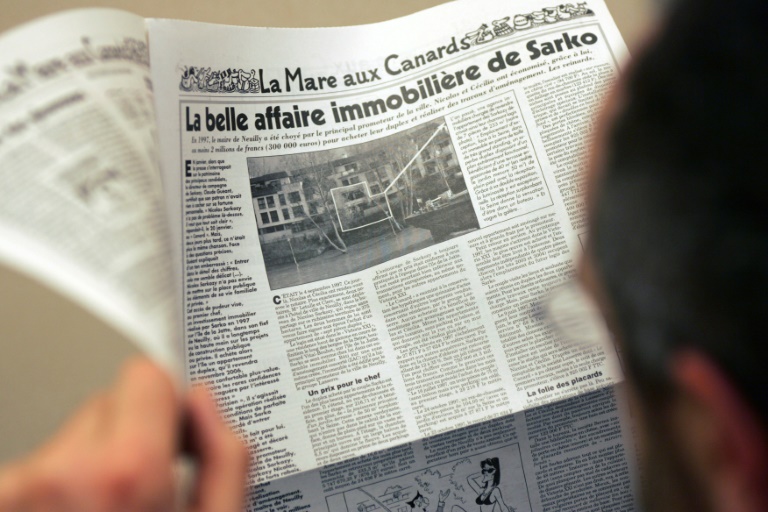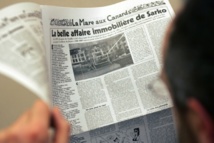"It's a newspaper that has managed to combine several newspapers in one," says Laurent Martin, a history professor at Paris 3 University and author of a book on the weekly.
"There are readers who only buy it for the cartoons, others who get it for political gossip... still others who read it because it has an activist tendency and then there are the people who buy it for exclusive revelations."
Maurice Marechal, the journalist who co-founded Le Canard Enchaine on September 10, 1915, made a point of honour of guaranteeing its financial independence, which he believed would allow it to satirise and criticise at will.
It has remained in the hands of its employees ever since, depending solely on sales that rake in millions of euros every year.
By comparison, the now world-famous Charlie Hebdo satirical magazine was about to go under before tragedy struck in January, when Islamic extremists gunned down 11 people at its Paris offices, prompting global recognition that boosted sales.
- 'Death to the tyrant' -
Le Canard Enchaine's two founders -- dogged by a lack of resources and personnel -- initially struggled to keep it afloat and after five issues, they closed the paper only to re-launch it again in 1916.
But it was not all smooth sailing during its early World War I days, when military authorities were given the green light to censor any information deemed dangerous.
Indeed, the paper's title means "chained duck" -- in French a "canard", or duck, is the colloquial name for a newspaper and the chains refer to its birth during the heavy press censorship of the war.
So the Canard Enchaine started inventing ingenious ways to criticise and circumvent censors using riddles, understatements, irony and sarcasm that have remained to this day.
Martin pointed to one example that saw a columnist write a story during World War I praising France's military ally the Russian Tsar, which was surprising for a left-leaning, anti-conflict newspaper.
"But as shrewd readers soon noticed... when you added together the first letters of each line (of the article), they spelt out 'death to the tyrant, we will get them'," he said.
Initially, the weekly was purely sarcastic but in the late 1950s, it added an investigative dimension with the arrival of new journalists who had extensive contacts, and went on to break big stories.
In 1979, the newspaper claimed that then president Valery Giscard d'Estaing had been given diamonds by the brutal Central African leader Jean-Bedel Bokassa -- an affair he denied but that tarnished his second, failed bid for the presidency.
Then in 1981, the weekly revealed that budget minister Maurice Papon had played a role in sending hundreds of French Jews to Nazi death camps during World War II.
Papon was later tried and convicted of crimes against humanity, for which he was sentenced to 10 years in prison.
And this year, the head of the powerful CGT union resigned after the weekly revealed he had run up tens of thousands of euros in expenses to renovate his flat and office.
- Can it survive? -
But the Canard Enchaine now faces stiff competition from investigative news website Mediapart, a relative newcomer that has had major scoops and quickly built up a following.
It may still be profitable, but sales have dropped over the past few years.
Laurent Valdiguie, co-author of a book that criticises the Canard Enchaine's working methods, says the weekly is threatened by an environment where information leaks at the speed of light.
"By not being online, their brand is absent and in ten years time, young people will no longer know the name Canard Enchaine," he says.
Editor Louis-Marie Horeau, however, remains confident.
"Our formula may be vintage and a little unhip, but at the same time it works," he says.
"By publishing their content on the Internet for free, (newspaper) sites have pirated themselves.
"The secret for freedom is to have financial independence."
-------------------------------------------------------------------------------------------------------------
"There are readers who only buy it for the cartoons, others who get it for political gossip... still others who read it because it has an activist tendency and then there are the people who buy it for exclusive revelations."
Maurice Marechal, the journalist who co-founded Le Canard Enchaine on September 10, 1915, made a point of honour of guaranteeing its financial independence, which he believed would allow it to satirise and criticise at will.
It has remained in the hands of its employees ever since, depending solely on sales that rake in millions of euros every year.
By comparison, the now world-famous Charlie Hebdo satirical magazine was about to go under before tragedy struck in January, when Islamic extremists gunned down 11 people at its Paris offices, prompting global recognition that boosted sales.
- 'Death to the tyrant' -
Le Canard Enchaine's two founders -- dogged by a lack of resources and personnel -- initially struggled to keep it afloat and after five issues, they closed the paper only to re-launch it again in 1916.
But it was not all smooth sailing during its early World War I days, when military authorities were given the green light to censor any information deemed dangerous.
Indeed, the paper's title means "chained duck" -- in French a "canard", or duck, is the colloquial name for a newspaper and the chains refer to its birth during the heavy press censorship of the war.
So the Canard Enchaine started inventing ingenious ways to criticise and circumvent censors using riddles, understatements, irony and sarcasm that have remained to this day.
Martin pointed to one example that saw a columnist write a story during World War I praising France's military ally the Russian Tsar, which was surprising for a left-leaning, anti-conflict newspaper.
"But as shrewd readers soon noticed... when you added together the first letters of each line (of the article), they spelt out 'death to the tyrant, we will get them'," he said.
Initially, the weekly was purely sarcastic but in the late 1950s, it added an investigative dimension with the arrival of new journalists who had extensive contacts, and went on to break big stories.
In 1979, the newspaper claimed that then president Valery Giscard d'Estaing had been given diamonds by the brutal Central African leader Jean-Bedel Bokassa -- an affair he denied but that tarnished his second, failed bid for the presidency.
Then in 1981, the weekly revealed that budget minister Maurice Papon had played a role in sending hundreds of French Jews to Nazi death camps during World War II.
Papon was later tried and convicted of crimes against humanity, for which he was sentenced to 10 years in prison.
And this year, the head of the powerful CGT union resigned after the weekly revealed he had run up tens of thousands of euros in expenses to renovate his flat and office.
- Can it survive? -
But the Canard Enchaine now faces stiff competition from investigative news website Mediapart, a relative newcomer that has had major scoops and quickly built up a following.
It may still be profitable, but sales have dropped over the past few years.
Laurent Valdiguie, co-author of a book that criticises the Canard Enchaine's working methods, says the weekly is threatened by an environment where information leaks at the speed of light.
"By not being online, their brand is absent and in ten years time, young people will no longer know the name Canard Enchaine," he says.
Editor Louis-Marie Horeau, however, remains confident.
"Our formula may be vintage and a little unhip, but at the same time it works," he says.
"By publishing their content on the Internet for free, (newspaper) sites have pirated themselves.
"The secret for freedom is to have financial independence."
-------------------------------------------------------------------------------------------------------------









 Home
Home Politics
Politics











